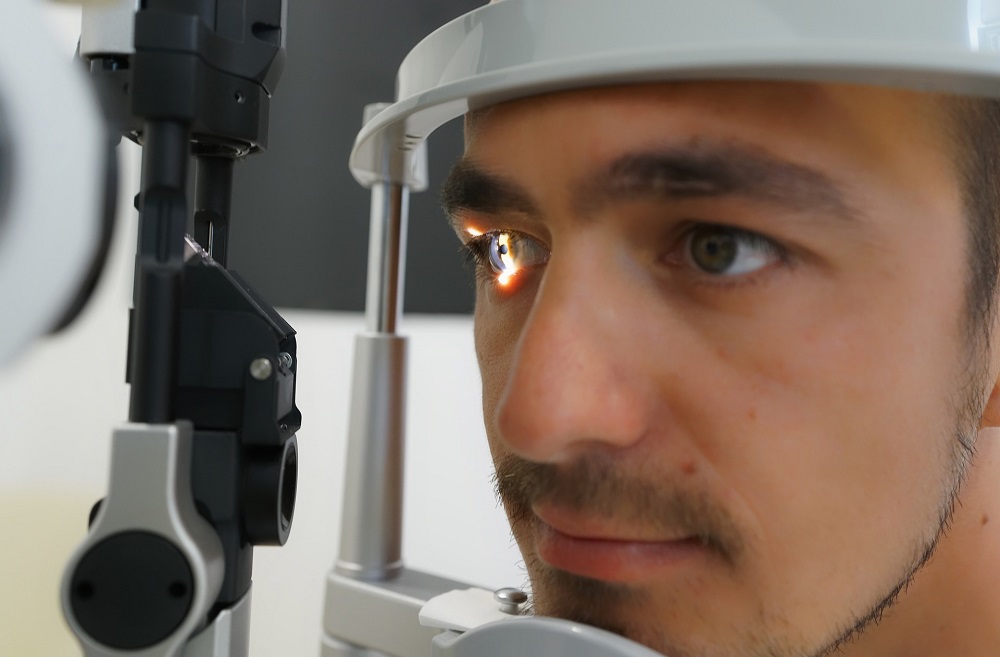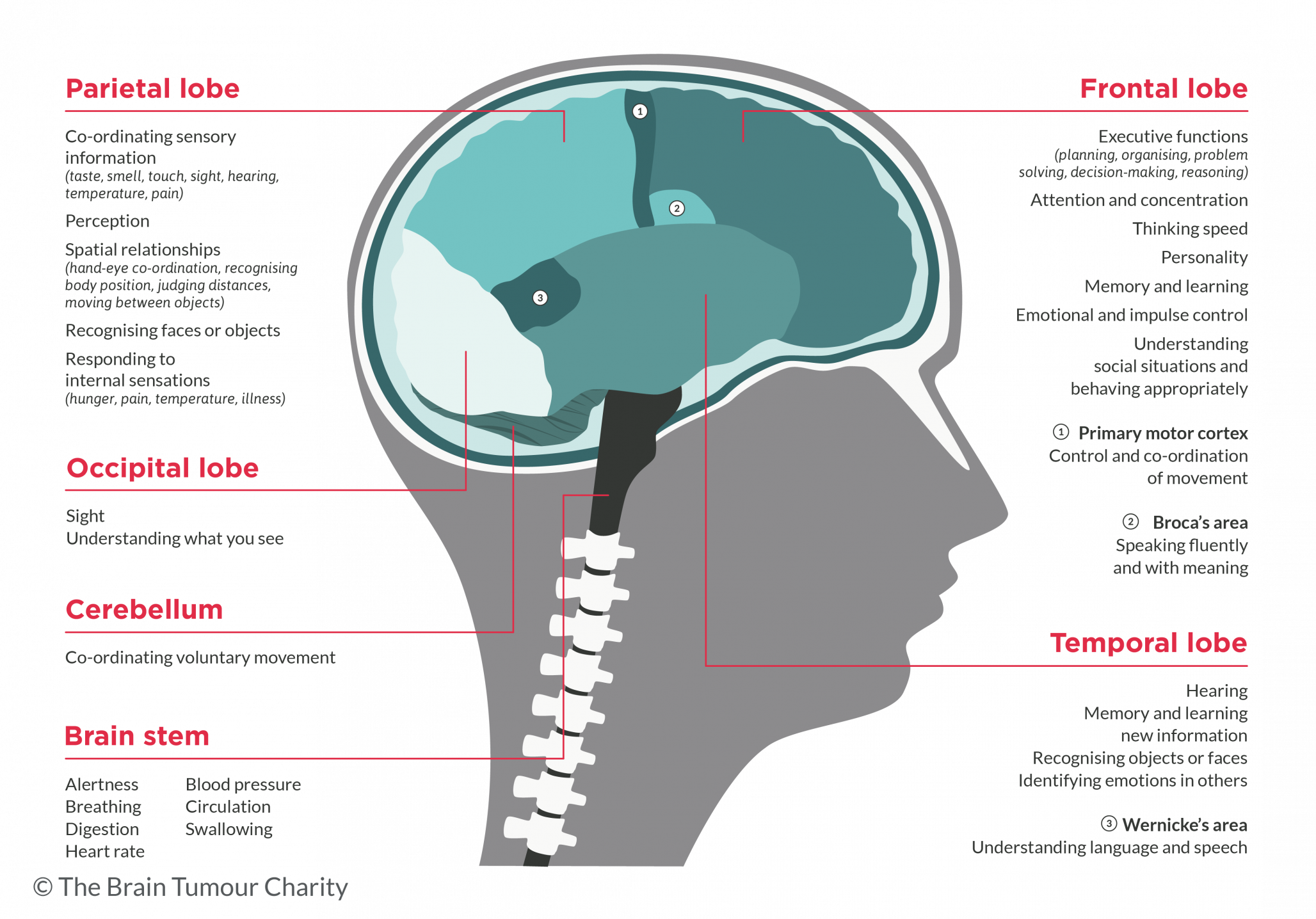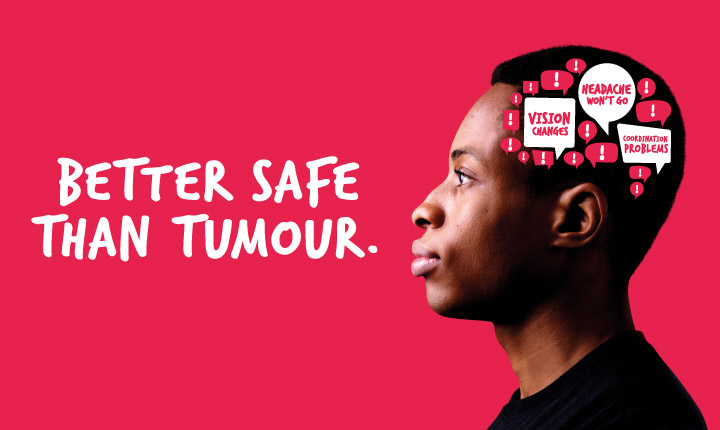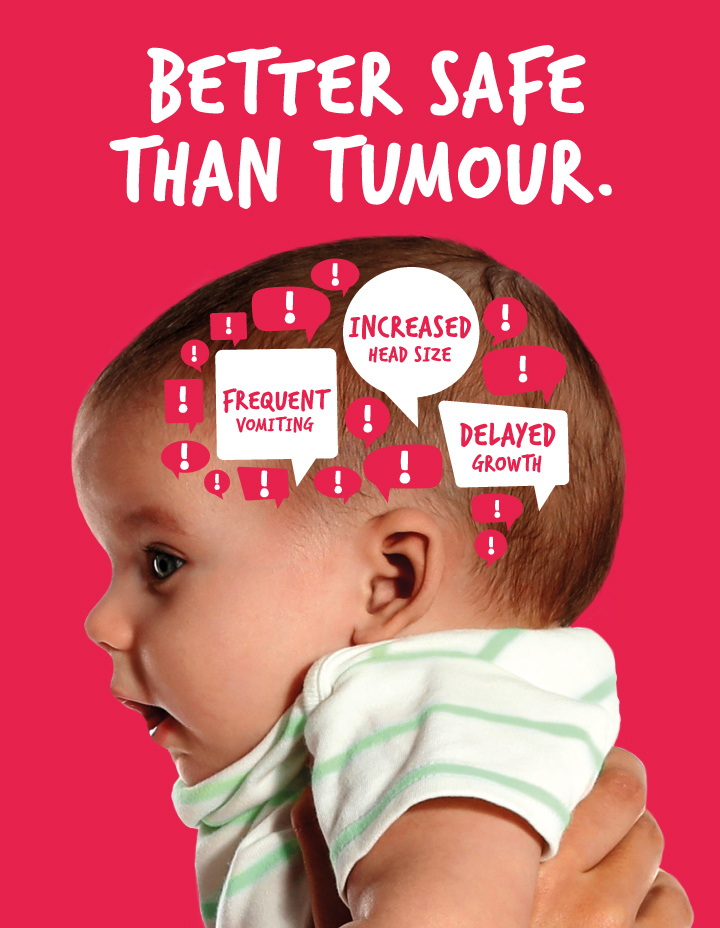Change in vision
Brain tumour symptoms can include changes in vision, like blurred or double vision, abnormal eye movements, restricted field of view and more.

Short summary
A brain tumour can cause a change in vision by causing pressure on the optic nerve or by creating swelling of the optic disc in the back of the eye.
On this page we’ll cover the changes in vision that can be brought on by brain tumours. We’ll look at:
- What changes in vision can a brain tumour cause?
- Why can brain tumours cause a change in vision?
- Changes in vision caused by tumour positions
- What to do if you think you have a brain tumour
Please keep in mind that brain tumours are relatively rare. So, if you’ve had a change in vision, it’s likely that your symptoms are NOT because of a brain tumour. But, it’s always important to get any symptoms checked out at an opticians.
Other symptoms
Use our Better Safe Than Tumour symptom checker to check for other brain tumour symptoms.
Eye tests and brain tumours
Brain tumour can sometimes be detected through eye tests.
Get your free Information Pack
Our Brain Tumour Information Pack can help you better understand your diagnosis and feel confident talking to your medical team.
What changes in vision can a brain tumour cause?
A change in vision sometimes caused by brain tumours is blurred vision. You could notice that it has become hard to watch TV or read.
Another change in vision could be a sudden loss of vision lasting a few seconds (‘greying out’). This is usually related to changes in your posture, like suddenly standing up.
Or you may find you have lost part of your field of vision. This could lead to you bumping into objects. Or you could feel as if objects or people are suddenly appearing on one side of you.

Why can brain tumours cause a change in vision?
Remember that there are lots of conditions that could cause changes in vision, and just because you are experiencing these doesn’t mean you have a brain tumour. The RNIB have a lot of information about other eye conditions and resources that could help.
But, the changes in vision that ARE caused by brain tumours can be the following.
Swelling of the optic disc
Changes in vision can be due to the optic disc at the back of your eye becoming swollen. This is because of increased pressure in the skull. The optic disc is the point on the retina where the optic nerve enters the eye from the brain. The retina is the layer of light-sensitive cells at the back of the eye.
Optic disc swelling can be caused by a few different things. But when it is caused by raised intracranial pressure (ICP), it’s known as papilloedema.
Papilloedema can be picked up by opticians during normal eye examinations. This can be important as people don’t usually experience the visual symptoms in the early stages of papilloedema.
Not all patients with raised intracranial pressure develop papilloedema. This depends on the size of the tumour and where it is. Also, patients who have previously had papilloedema might not get it again in the future.
Pressure on the optic nerve
As the tumour grows, or there is a build-up of cerebrospinal fluid in the brain, it can squeeze normal healthy brain tissue including the main cranial nerves within the brain. The resulting pressure can alter how well the nerve works, and if this happens to the optic nerve, your vision can be affected.
Changes in vision caused by tumour position
Symptoms of a brain tumour can vary depending on the tumour’s location, and several areas of the brain play a part in an aspect of vision.

Occipital lobe
The occipital lobe is the main area involved with vision. It processes the information coming from your eyes, so that you can understand what you see.
A tumour in the occipital lobe can cause changes in vision. You could struggle to see objects or colours or lose your vision completely. Or, it may cause loss of vision on one side.
Parietal lobe
Damage to the parietal lobe can cause difficulty with:
- Bringing together information from your different senses (touch, vision, hearing, smell, taste) and making sense of it. For example, a person could bump into furniture that they have seen, but have misjudged where it is.
- Co-ordinating movements
- Spatial awareness e.g. judging distances, hand-eye co-ordination
- Speaking, understanding words, writing and reading. It can also cause numbness on the opposite side of the body from where the tumour is.
Cerebellum
Damage to the cerebellum can cause flickering of the eyes, as well as problems with balance, a loss of co-ordination, difficulty walking and speaking, vomiting and a stiff neck. It can also affect the fine co-ordination of the muscles leading to problems with dexterity (skills in using your hands).
Brain stem
For tumours in the brain stem, symptoms can include double vision, as well as unsteadiness and difficulty walking, facial weakness and difficulty speaking or swallowing.
Temporal lobe
A tumour in the temporal lobe can affect the ability to recognise objects, as well as identifying emotions in others, hearing, memory and learning.

I think I have a brain tumour, what should I do?
Brain tumours are rare, however, if you’re worried and a symptom like changes in vision persists or if you have more than one symptom of a brain tumour then:
- Talk to your doctor
GP appointments are usually quite short, so make sure you find out how to best prepare for your appointment. - Get an eye test
If your symptoms are limited to changes in vision and/or headaches, get your eyes tested by an optician before seeing your GP. - Go to A&E
If the symptoms are sudden or severe, you should go to your emergency department or call 999.
In this section

Know the Signs and Symptoms
Although brain tumours are rare, if you or a loved one are experiencing two or more of the signs and symptoms it’s important that you speak to your doctor to rule out a brain tumour.

Share your experiences and help create change
By taking part in our Improving Brain Tumour Care surveys and sharing your experiences, you can help us improve treatment and care for everyone affected by a brain tumour.